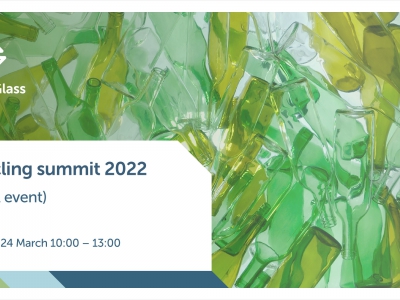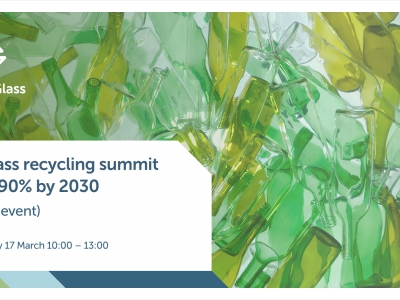As the representative body for the UK glass industry, we work hard with our members to increase glass recycling rates and to deliver a truly circular economy.
Part of this goal is maximising the collection of recycled glass (cullet) and supporting any initiatives that would increase glass recycling as a whole.
We believe the best way to increase the amount of cullet that returns to manufacturers is by reforming the current Producer Responsibility model and increasing recycling targets.
The Scottish Deposit Return Scheme (DRS) claims to generate more used beverage packaging for recycling, but waste management experts argue that including glass in a DRS would actually reduce the overall amount of glass recycled and would add significant complexity and inconvenience for consumers.
Our open letter
As part of our ongoing campaign to ensure the best system is in place for glass recycling, we have sent an open letter to the Cabinet Secretary for Environment, Climate Change and Land Reform Roseanna Cunningham addressing our concerns about including glass in the proposed Scottish DRS.
Supporters of the letter experts from across whole glass supply chain such as the Chartered Institute for Wastes Management, the Scottish Environmental Services Association, the British Soft Drinks Association, the Scottish Beer and Pub Association, Scottish Retail Consortium, UK Hospitality Scotland and the Scottish Wholesale Association
Read the Cabinet Secretary's response to our letter.
- Reports
-
Recycling DRS in Scotland, Oakdene Hollins
This report examines deposit return schemes across Europe to inform the debate on the potential impact of introducing a recycling DRS in Scotland that includes glass.
Comparison between the British Glass Scottish DRS model and the Zero Waste Scotland DRS model, Anthesis
This report examines the assumptions that Zero Waste Scotland (ZWS) made in their DRS model and compares it to assumptions that were made in a DRS model that Anthesis prepared for British Glass during the consultation period. It highlights a number of areas where the ZWS model may need to be revisited.
Glass Recycling in Scotland - Consumer Research, June 2019, Toluna
This report gathers consumer opinions on the proposed Scottish 'all-in' deposit return scheme.
Improving Glass Recycling in Scotland
This two page report offers an alternative and improved model for glass recycling as opposed to the proposed Scottish recycling Deposit Return Scheme.
- Press Releases
-
10 December - Seasonal Overload Threatens Viability of Deposit Return Scheme if Glass Included Say Experts
Waste industry experts are warning that facilities for returning glass bottles in retail stores will not be able to cope with the huge rise in numbers at peak times such as Christmas, Easter and during hot summers.
6 November - Keep Glass Out of Deposit Return Scheme to Cut Carbon Say Experts
Claims about the carbon-saving benefits of including glass in the Scottish recycling Deposit Return Scheme are being disputed by waste and drinks industry experts, with estimates from Scottish Government some 500% wide of the mark.
25 October - Evidence shows glass in Deposit Return Schemes drives increase in plastic
Serious concerns have been raised regarding the unintended environmental consequences of glass being in a DRS, including an increase in plastic use following the implementation of similar schemes across Europe, the effect on kerbside recycling and incentivising customers to buy larger pack sizes.
See the full release on our News page.
10 September - British Glass disappointed with DRS latest
Scotland's recycling deposit return scheme continues to move forward with draft regulations being laid in the Scottish Parliament by Cabinet Secretary for the Environment, Climate Change and Land Reform, Roseanna Cunningham despite concerns from British Glass and 16 supporting organisations that glass should be excluded.
21 May - £50m DRS will 'hit glass recycling and increase plastic usage'
Original industry concerns were laid out following the announcement of glass' inclusion in the proposed DRS in May, which included extra costs to run the scheme, a reduction in the recycling rate of glass, job losses in the glass sector and a switch to plastic.
- Key Information
-
British Glass is not opposed to Deposit Return Schemes (DRS) in principle but including glass in the proposed recycling DRS will reduce glass recycling rates, pass massive costs onto consumers and incentivise producers to fill plastic bottles not glass. Outlined below is a summary of our main concerns with the current proposed scheme.
1. Including glass in the recycling Deposit Return Scheme will disrupt glass recycling and not achieve a circular economy in Scotland.
- The recycling DRS only provides manufacturers with more of the coloured glass they already have and not the clear glass they need to supply the Scottish spirit’s market
- A recycling DRS will cherry pick the easy to recycle glass beverage bottles from kerbside collections, leaving the remaining food glass packaging to be handled by kerbside along with other waste streams. Such cherry picking can make kerbside collections for glass unviable meaning more glass will go to landfill.
2. Including glass in the Deposit Return Scheme will mean a dramatic increase in costs and inconvenience for consumers.
- At a 90% return rate, 42% of the costs of a DRS come from the public's unredeemed deposits. At 80%, it rises to 84% of the costs and the public will also pay for the recycling of the 26% of containers that makes up non-DRS glass packaging. Hence, this is not a polluter pays system.
- The Scottish Government's DRS return targets are unrealistic. Scotland has no refillables infrastructure or bring back culture while research conducted by Toluna shows 25% of consumers won't return any containers to reclaim their deposit.
3. Including glass in the Scottish Deposit Return Scheme is economically inefficient.
- Including glass doubles the cost of a Deposit Return Scheme while Zero Waste Scotland's own figures suggest the inclusion of glass will increase costs by around £25m a year. However, glass industry figures predict this to be significantly higher at two to three times this figure.
4. There is a better alternative proposal.
- An Extended Producer Responsibility (EPR) model would be better suited to increase the amount of glass that is recycled and is due to come into effect in 2023.
- Deposit Return Scheme news
-
All of the latest news regarding a Deposit Return Scheme.
- The Scotsman - Calls for levies based on size ahead of Scotland’s new bottle deposit-return scheme
- Scottish Grocer and Convenience Retailer - C-store DRS test finds glass problematic
- Business Insider - Give small shops a say on bottle return scheme, says FSB
- Business Green - Our independent craft brewers need certainty on deposit returns
- The Grocer - What the experts think about the future of DRS: watch The Grocer webinar
From our partners
Miles Beale, Chief Executive of the Wine and Spirit Trade Association, said:
'We welcome this research into proposals for a Scottish Deposit Return Scheme (DRS). We believe more information and research is required to fully understand the impact of different packaging materials, how best to reduce littering and identify preferred materials for packaging long term. We urge Government not to rush with this policy but to reconsider the proposed time frame for implementation to allow the UK wide proposals for collections to come into effect, and ensure proper scrutiny and testing of a DRS.'
Glass is wholly inert and is made from naturally available materials. We are concerned that glass in a DRS will increase consumer emissions and time, increase breakages, and negatively hit the poorest in our society (WRAP research shows low income families are the least likely to return bottles and therefore likely to disproportionately fund the scheme [1]. Glass does not create micro-plastic pollution and we believe it is the best enclosure for packaging beverages.
Until more is known about plastic pollution, and the ramifications of micro and nano-plastics on the human body and our marine environment, Government should promote glass and not threaten its use by including it in a DRS."
[1] 2015, www.wrap.org.uk/sites/files/wrap/WRAP-anaylsis-recycling-performance-2012-13.pdf
Adeline Farrelly, Secretary General, FEVE – The European Association for Container Glass representing over 90% of the European glass packaging industry.


